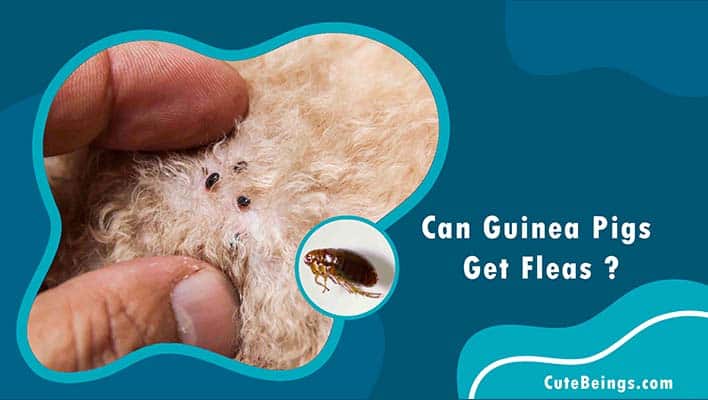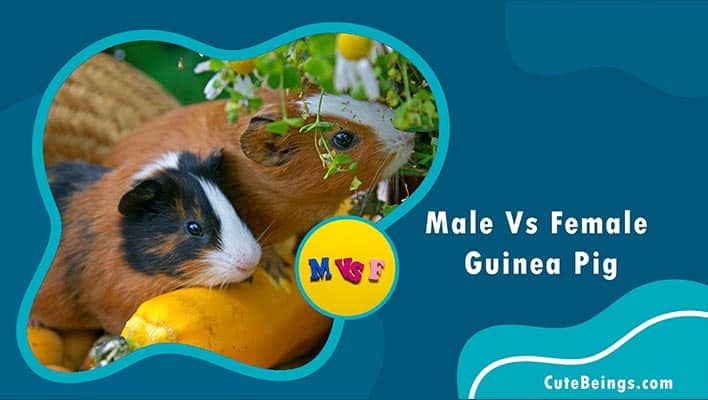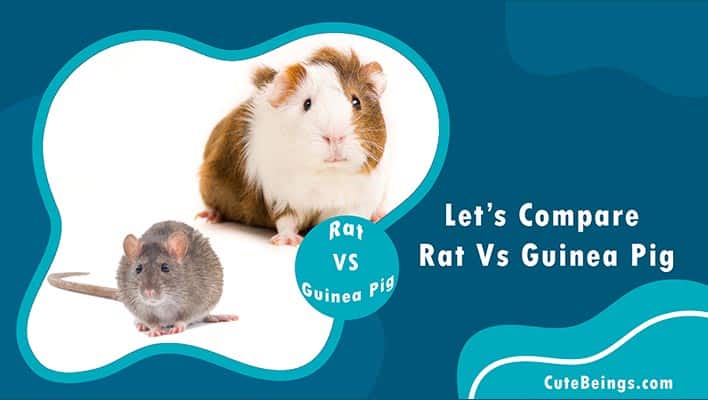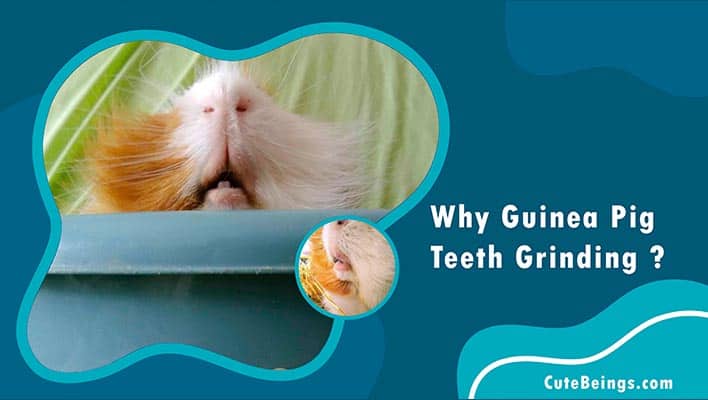Just like any other animals such as cats, dogs or ferrets, guinea pigs do get fleas. These pocket pets have warm blood so they could easily be victims of fleas but usually these furry creatures are not the main host for flea.
A flea is different from mite. When you explore guinea pig fur mites you would find trixacarus caviae (sarcoptic mange mites) and chirodiscoides caviae as the most common mites. Though both mites and fleas are small parasites they have their own differences and similarities.
It will be very hard for you to keep away these skin parasites as they will make your pet’s fur as their home. It doesn’t really matter how clean your pet is or how sanitary you keep the habitat still they find a way.
As guinea pigs fur is enough to create a nice hiding spot for guinea pig fleas, they can live on once they burrow into guinea pig’s fur. When you check your pet you will notice the fleas or you can easily see the grime they leave behind on your pet’s fur.
If you have few guinea pigs, not all of them need to have fleas. When one guinea pig gets a flea infestation that guinea pig could pass onto other cage mates. The quicker you find the flea infestation, treat it to stop spreading it out and by doing treatments you can avoid the situation from getting worse.
If you can recognize the symptoms or signs, you can do the flea treatment according to symptoms so you can keep your guinea pig or your entire guinea pigs flea free.
Table of Contents
What Are Fleas?
Fleas are kind of interesting insects, they can’t fly but they can jump massive distances. Also they are small and wingless and when considering the color they are mostly black or brown. Length can be varied and they are usually up to 2mm in length. They have hard shells flat bodies and hard shells can protect them from danger.
When a female flea lays eggs, it can lay 50 eggs per day and 500 in total. They can lay eggs anywhere such as rugs, on your pet’s fur, carpets or on any soft furniture in your home.
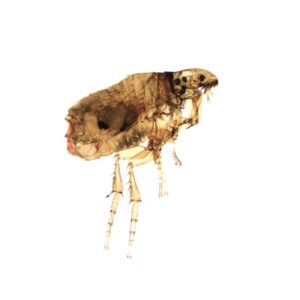
It is the same ideal temperature for fleas as guinea pigs which is 65 to 75 degrees Fahrenheit so anywhere your guinea pig goes, fleas can go. Normally guinea pigs don’t like sunny areas or too hot weather and fleas are also the same.
Fleas must feast on warm blood to survive, most household pets including dogs and cats and also human can be at risk from flea bites.
About fleas, exceptionally fast reproduction is the worst thing. Killing fleas manually is not a proper option as if you miss one or two they can reproduce quickly and your problem will remain the same.
How Can My Guinea Pig Get Fleas?
There are many different ways for your pet to get fleas. They don’t get fleas intentionally but they would get fleas from these ways.
-
If you have only guinea pigs it is highly unlikely for your pets to get fleas. If you have another pet such as dog or cat than the furry pets, that pet could get fleas first and then fleas can jump on to guinea pigs as fleas can jump a long distance.
-
As pet owner if you are thinking about your pet’s freedom you might let your guinea pig to run around the backyard or garden and your pet could get fleas from grass.
-
Mostly guinea pigs have humid and wet surroundings due to their poop and pee. If you have provided less absorbent bedding to your guinea pigs that makes the condition better for fleas grow up extremely fast.
-
If you buy hay as hay bales or from a farmer’s supply, there is a big possibility that hay you buy might contain fleas.
-
Even from humans guinea pigs can get fleas but this method is less common. Usually fleas are good at hitch rides on human’s cloth or body. Human cloths provide the ideal vector so fleas can grab on to them when humans walk through grass. Also for an example a cat flea can hang onto cat owner’s clothes when the pet owner cuddles the cat for some time.
How Would I Know My Guinea Pig Has Fleas?
It would be quite simple to find out about your guinea pigs flea problem but some miniature pets might not show any signs of a flea invasion. Fleas are fairly large insects even a few can cause a lot of suffering to your guinea pig.
Your cavy would be biting or nibbling at its skin.
You might have several cavies and you will notice them itching. If you any other pets you will definitely notice that they are also infested. Sometimes you might see red patches or bumps which you get as a result of flea bite on you. Also itching can also occur on you.
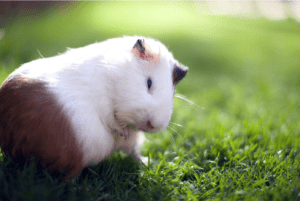
Flea dirt.
Normally a flea egg is white in color and very hard to notice. But flea dirt which is a mixture of dried blood and flea poop can regularly be noticed on the guinea pig’s skin which suffers from fleas. Flea dirt is reddish brown in color and can be easily misguided for grains of soil. Do a wet paper test on your guinea pig’s coat, which is a fine test to identify real flea dirt and actual dirt. Get a cotton wool or a wet paper towel and rub gently some of the brown specks. If the brown speck turns to reddish brown speck it is flea dirt.
Live fleas.
If you suspect your pet to have fleas you are able to see them when you stroke the fur backwards or part the fur. As fleas are very quick you might not able to see them. But in small pets such as rats, hamsters and chinchillas flea are visible and check the around the neck and along the spine so you can notice them.
Hair loss and scaling.
Hair loss patches and skin scaling can be seen on your guinea pig and further they could have a moth eaten appearance.
Anemia
Heavy flea infestation can lose so much blood in pets and these pets may become anemic. Your pet will look weak and have pale gums.
Skin issues.
Even if it is not fleas take your guinea pig to a vet when you see irritated or red skin on your guinea pig. This is clear sign to express that there is something wrong with your pet and it would worth taking it serious and act without any delay.
Unwillingness to move and lethargy.
If your pet is having fleas it could be losing fair amount of blood and this could cause your guinea pig to be lethargy. Also your pig will show its unwillingness to move which is a completely different state from its day today activities.
How To Treat A Flea Infestation
Flea infestation is a challenging state to fully eliminate. It could be frustrating but there are flea preventative methods you can follow to avoid or solve an infestation issue at the beginning. Basic rules are not hard to follow but you need to follow them carefully if you expect proper results.
Not only your pet needs a treatment but also the home will require the treatment if you believe that there is a flea infestation.
-
Always wash your hands before handling or cuddling your guinea pig. This is a very important measure not just only as a flea preventative step but for overall safety of your small animal. As long as your hands are clean you won’t cause any health damage to your loving pet.
-
If you have a variety of pets make sure to take them through essential measures to help them to prevent fleas. By doing so you can rest your mind ensuring that they won’t be carrying any parasite to your home.
-
Do not take your cavies outside to grass. You might feel as it is a good thing that letting your cavy to eat some grass in fresh air. Grass is a safe hiding place for guinea pig fleas. So keep in mind that you will have to spend a lot of time and a huge effort in treating to take off the flea issue from your pet. As guinea pigs run through grass they could easily get fleas which were already in grass.
-
Check your furry pet randomly for any issues as this could help you in several ways. Examining your pig’s skin and fur daily will be the best choice you can have but do it as you get time to do so. But when you are examining, take a close look at your pig’s skin for any flea bite. You may be able to notice actual fleas or flea dirt, thanks to your through search.
-
Keep your guinea pig cage’s cleanliness at the highest state at all the time. When you clean, wipe down and clean the entire living space of your pets.
-
Clean your cavy’s bedding at least every couple of days. Bedding such as blankets, all sheets, fabric toys, mats and pillowcases must be washed using hot water kept dry as much as possible. When you dry them after washing, dry them well. You can also take the bedding to a dry cleaner but be aware of the chemical use and make sure the chemicals are not harmful and pet friendly.
-
Cover all the holes to your garden as much as possible so wild animals won’t be able to enter or get into near to your home.
-
Remove any fragments around your house.
-
You can use a steam cleaner to clean carpets and upholstery in your furniture. You can either buy or rent a steam cleaner to remove any flea infestation from your house.
-
If you want to get rid of fleas, flea eggs and flea dirt use a powerful vacuum cleaner on carpets, rugs or on furniture to pick them up and remove any fragments to a hard plastic bag then seal it and dispose as quickly as you can.
-
You can comb to remove adult fleas from your cavy’s fur. When you comb take a good look and inspect the flea comb for any flea dirt, fleas or flea eggs. If you can comb your pig twice a day for a week continuously you can make sure that your guinea pig is flea free.
-
You can use harmless anti-flea products in your home. If you are facing regular flea infestations this method will benefit you. These anti-flea products can be used directly to floors, rugs and carpets.
How Can I Remove Fleas From My Guinea Pig?
There are several methods to remove fleas from a guinea pig. Everybody knows that pet guinea pig is a flimsy animal and it can’t be treated as you treat to other pets such as cats and dogs. You need to do it carefully and gently and if you believe any flea infestation in your pig try following methods to do treatments.
-
One of the best and the safest method is to remove fleas from your pet is through bathing. A bath in dawn dish soapy water is a better treatment as this method instantly kills fleas on any animal. Also if you considering the use of flea shampoo speak to your veterinarian first and take his or her opinion about it. You can use a shampoo but it won’t affect the fleas but they would die from drowning in the water. Take time when you wash your guinea pig as fleas would take some time to drown in the water.
-
After finishing the bath use a flea dip and give your pig a good dip in a well known flea dip product.
-
If your problem is too serious or you want your expert to give a solution to your flea issue, speak to a vet about the most effective and the safest methods for flea removal. You can also use a vet prescribed flea medication which kills fleas.
-
When you groom your pet use a flea comb. Check around the tail and neck areas for fleas. Once you comb fleas out dip the comb in a bowl or basket of soapy water so these parasites would die due to drowning.
-
There is no need of quarantine if you have only guinea pigs but if you have several pets (different species), keep them separate until you treat the flea problem.
Important
-
When you apply flea medication or any other medication avoid your pet’s nose, eyes and mouth.
-
Use protection for yourself as well. When you apply flea removal medication or products wear gloves and other required shielding gear.
-
Always follow specific instructions on the flea removal product or exact veterinarian’s instructions when you use flea medication as too much would result in overdose and that could be harmful to your pet.
-
Female guinea pig that is pregnant and a baby guinea pig could easily be victim of fleas as they have high blood flow while a male guinea pig is less likely to get fleas at first. As there is a big possibility to get fleas to all male and female pigs keep an eye of them and treat them as needed if you suspect any possible signs of fleas.
Flea Bites
When your pet has fleas, flea bites are very common around the armpits, waist, groin, breasts or in the folds of knees or elbows.
If you treat them quicker flea bites are not that harmful for your pet. These bites never become large but they are itchy and can cause discomfort. Later an additional rash may appear around these bites and that will be the last thing that could happen. If you don’t treat your pet quick enough your pig will not stop scratching. The main thing you need to focus on is the skin damages as it could cause various health risks such as bacterial infections.
Now you know that guinea pigs are not resistant to fleas and these fleas could cause flea allergy dermatitis. In such situations you need to act fast otherwise fleas would reproduce and flea infestation will be worse and that would definitely lead to anemia.
Frequently Asked Questions (FAQ)
Can Guinea Pigs Get Fleas From Cats And Dogs?
Yes, your pet guinea pig can get fleas from dogs and cats. As you know cats and dogs run around the house, play on grass so there is huge possibility for them to get fleas. If they go near your furry pet fleas can jump from their bodies to your guinea pig’s body.
Consult your veterinarian to get a safe medication to all your pets. Normally you won’t be able to use other pet’s medication on your guinea pig as it has a delicate skin. So always go for your vet’s advice or the pet store recommendation. While you are treating your pets apply the treatments to your house as well because there will be flea eggs and hatch in rugs, carpets and upholstery. If you don’t remove all the parasites from the surroundings it will be very hard to control the flea issue in your house.
Can I Use Cats And Dogs Flea Treatment On My Guinea Pig?
No you can’t use the same product. Chemicals which are used for cat and dog flea medication could be toxic to guinea pigs.
Can Guinea Pigs Get Fleas From Hay?
Unfortunately yes. Guinea pigs would get fleas from hay. Fleas need a host to flourish and they can wait a long period to find a suitable host.
If you buy hay in bulk or hay from a farmer’s supply, there is a huge possibility that hay might have fleas.
The companies who process and package hay do not make that hay flea free but the possibility of having fleas is very low.
When you purchase hay, store them correctly and keep away from moisture. Because if the hay gets moist that could attract fleas, so store it in a safe place. When you feed your guinea pig, feed them fresh and good quality hay as it would be beneficial for your pig’s health.
Can Guinea Pigs Get Fleas From Grass?
Yes guinea pigs get fleas from grass. You might let your guinea pig to run around your backyard or the house and there is a huge chance that your guinea pig would get fleas from grass.
We keep and let our guinea pigs to run in shady areas and these shady areas are perfect for fleas as well. We prevent guinea pigs from direct sun light to keep them healthy but that’s a big advantage for flea infestation.
Can Indoor Guinea Pigs Get Fleas?
Yes indoor guinea pigs also can get fleas. There may be flea infestations in rugs, carpets or upholstery in your house. When your pig runs inside the house fleas can jump to guinea pig’s fur.
Can The Fleas Migrate To Other Pets?
Unfortunately fleas can migrate from one pet to another. The worse thing is if one of your guinea pigs gets fleas that can spread to other guinea pigs in no time. When there is such a situation consult your veterinarian quickly if you have no idea about your next step. Do not try to experiment things as your guinea pig’s health comes first.
If you notice a flea infestation, treat it as soon as possible neglecting the size of the problem as it could become a great health issue for your guinea pig.
Further Reading
Learn about a most common disease that can affect Guinea pigs. Read the article below to keep your beloved guinea pig out of it.

Hello, my name is Michelle and I’m a pet lover. For the past 12 years, I’ve been caring for pets. As a result of this, I decided to share my personal experience with you.

